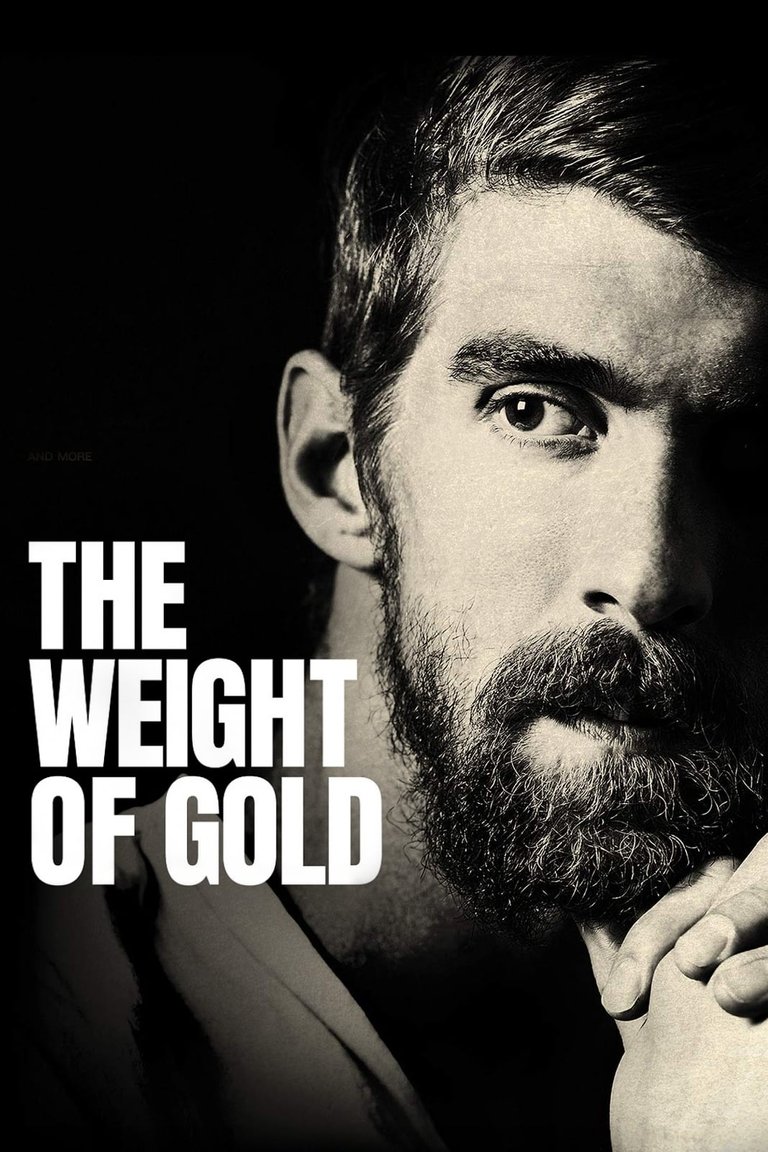Review || The Weight of Gold - [ESP-ENG]
El peso del oro es un documental que estaba basado en la salud mental de los atletas. Pocas veces, se mencionan los daños que pueden estar pasando por la mente de algún competidor, la presión, distintos escenarios, la prensa, hay mucho en torno del deporte que causa daños mentales en la cabeza de los competidores. Aquí, se enfocan exclusivamente en los deportistas que han disputado los juegos olímpicos, evento que se lleva a cabo cada 4 años, donde muchos pueden ser grandes figura y otros grandes atletas quedan en el olvido.
The weight of gold is a documentary that was based on the mental health of athletes. Rarely, it is mentioned the damages that may be going through the mind of a competitor, the pressure, different scenarios, the press, there is a lot around the sport that causes mental damage in the head of the competitors. Here, they focus exclusively on athletes who have competed in the Olympic Games, an event that takes place every 4 years, where many can be great figures and other great athletes are forgotten.
Prepararte durante algunos años, para luego competir en un evento mundial, te genera mucha motivación, seguido de gran presión y algunos atletas suelen tener cierto daño de salud mental. Dentro del peso del oro, atletas como: Michael Phelps, Apolo Ohno, Shaun White, Lolo Jones, entre otros, aparecen relatando sus experiencias y comentando lo duro que puede ser competir en unos juegos olímpicos. Cabe mencionar que todos los que se muestran en el documental, son ganadores de alguna medalla, pero, no se salvaron de atravesar un periodo de daños a nivel mental y psicológico.
Preparing for a few years, to then compete in a world event, generates a lot of motivation, followed by great pressure and some athletes tend to have some mental health damage. Within the weight of gold, athletes such as Michael Phelps, Apolo Ohno, Shaun White, Lolo Jones, among others, appear relating their experiences and commenting on how hard it can be to compete in the Olympic Games. It is worth mentioning that all those shown in the documentary are medal winners, but they were not spared from going through a period of mental and psychological damage.

Empezamos la producción recordando el momento de pandemia, cuando todos quedamos encerrados, los atletas no podían realizar su trabajo y los juegos paralímpicos del 2020 quedaron totalmente cancelados. Sin duda, para mucho fue un momento de ansiedad, los cambios tan bruscos tienen repercusiones y en un competidor suele ser muy fuerte. Estar acostumbrado a presentarte ante miles de personas y ahora de momento se esfuma todo el público. Los eventos se detienen, la preparación queda a un lado, tu práctica no encuentra sentido y mentalmente se puede caer en un pozo.
Hay un segmento interesante donde relatan un poco la infancia de un deportista, muchos no piensan en nada, olvidan un poco los estudios, no están pendiente a relaciones, simplemente su foco está en lograr sus metas, ser grandes en el deporte y dejar una huella. Sí, son enormes sacrificios que un joven debe tener, por supuesto, no es fácil. Los padres aquí tienen gran responsabilidad, tratar de mantener un equilibrio y no dejar que la presión a poca edad los consuma. Desde niño, se decía que Michael Phelps, sería un grande en la natación y eso genera mucha presión.
Algunos atletas con grandes proyecciones, la prensa los empieza a catalogar de estrellas mundiales, mediáticamente los obligan a cargar con el peso de obtener una medalla de oro. Llegar con 19 años a tus primeros juegos olímpicos y tener una carga de ganar si o si, mentalmente tiene que ser muy duro y puede jugarte de mala manera. También, existen los atletas que llegaron a tener un fallo, no completaron la meta, no consiguieron cumplir con las expectativas y creen que todo su mundo se vino abajo. Realmente, son juegos, más allá de eso, la vida debe continuar y algunos atletas no tienen eso en la mente.
La prensa y los fanáticos pueden elevar mucho a un deportista, ganaste la medalla de oro y te conviertes en el mejor del mundo. Luego, vuelves a ir a otro evento, pierdes y rápidamente eres un fracasado. Las emociones, las criticas, todo es un cambio constante y claramente no todas las personas pueden saber controlarlo. Los fracasos son parte del deporte, parte de la vida, lo que menos deseas es que te coloquen en lo más profundo del desprecio y mucho menos cuando antes te catalogaban una estrella. Hay una frase muy importante, "nadie se acuerda del cuarto lugar", simplemente triste, pues hay solo 3 medallas para repartir.
We started the production remembering the pandemic moment, when we were all locked up, the athletes could not do their work and the 2020 Paralympic Games were totally cancelled. Undoubtedly, for many it was a moment of anxiety, such abrupt changes have repercussions and in a competitor it is usually very strong. Being used to presenting in front of thousands of people and now all the audience is gone. The events stop, the preparation is left aside, your practice does not make sense and mentally you can fall into a pit.
There is an interesting segment where they tell a little about the childhood of an athlete, many do not think about anything, they forget a little about studies, they are not aware of relationships, their focus is simply to achieve their goals, to be great in sport and leave a mark. Yes, these are huge sacrifices that a young person must make, of course, it is not easy. Parents have a great responsibility here, to try to maintain a balance and not let the pressure at a young age consume them. Since I was a child, it was said that Michael Phelps would be a great swimmer and that generates a lot of pressure.
Some athletes with great projections, the press begins to classify them as world stars, and the media forces them to carry the weight of winning a gold medal. To arrive at 19 years old to your first Olympic Games and have the burden of winning if you have to, mentally it has to be very hard and can play you in a bad way. Also, there are the athletes who came to have a failure, didn't complete the goal, failed to meet expectations and believe their whole world came crashing down. Really, it's games, beyond that, life must go on and some athletes don't have that in mind.
The press and the fans can elevate an athlete a lot, you won the gold medal and you become the best in the world. Then you go again to another event, lose and you are quickly a failure. Emotions, criticism, everything is a constant change and clearly not everyone can control it. Failures are part of the sport, part of life, the last thing you want is to be placed in the depths of contempt and much less when you used to be labeled a star. There is a very important phrase, "nobody remembers the fourth place", simply sad, because there are only 3 medals to share.

Sources
Apolo Ohno, es un patinador de velocidad y obtuvo la medalla de oro en 2 ocasiones. Menciona que la diferencia entre cada competidor, suele ser de 4 segundos, la capacidad de concentración debe ser muy grande, porque puedes perder la victoria sin darte cuenta. Permaneces durante 4 años preparándote, para poder completar la pista lo más rápido posible en el evento más importante. Y nuevamente, recalco la frase del cuarto lugar, posiblemente entre el primero y el cuarto, tengamos una diferencia de solo 6 segundos y eso fue todo para que más nadie mencione tu nombre, a pesar de haber estado a pocos segundos de colgarte una medalla.
El tema del salario, también es importante a considerar, muchos ganan muy poco dinero y la minoría de deportistas son los que pueden llegar a ser millonarios. Lolo Jones, competidora de atletismo, ganadora de medalla de oro, menciona que, en algún momento, estuvo trabajando en un gimnasio creando batidos. Hay muchas disciplinas que son poco apoyadas, la familia debe correr con muchos gastos económicos, para la preparación del atleta y su estilo de vida. Ciertamente, no hay mucha repercusión en algunas disciplinas que se realizan en los juegos olímpicos y solo son vistas en el momento que se realizan los eventos.
"Cuando tu seguridad económica está tan ligada a tu éxito, la presión por hacerlo bien aumenta". Otra frase muy importante remarcada en la producción, la cual, me parece que te fortalece, te genera motivación de querer hacerlo mucho mejor y de prepararte como nunca hacia un evento como los juegos olímpicos. Pero, también otras personas pueden verlo de un punto de vista diferente y la presión los consuma y les provoque daños mentales. Steven Holcomb, competidor de bobsleigh, recibió una gran alerta, debía ganar el oro, de lo contrario no podían seguir apoyando su carrera.
El documental es interesante, la parte psicológica de un atleta es fundamental y no se habla mucho de ello. En esta producción, incluso, nos muestran caso de algunos competidores que decidieron quitarse la vida. La mayoría de los atletas que fueron a las olimpiadas, no obtienen muchos recursos, hay cantidades de disciplinas que no son mencionadas, los deportistas no ganan lo suficiente y aparte reciben mucha presión que los lleva a tener un daño en su salud mental. Puedes encontrar el documental en HBO Max, tiene una duración de 59 minutos y lo recomiendo totalmente. Podrás entender los enormes sacrificios que hay detrás de un atleta.
Apolo Ohno, is a speed skater and won the gold medal 2 times. He mentions that the difference between each competitor, is usually 4 seconds, the ability to concentrate must be very large, because you can lose the victory without realizing it. You stay for 4 years preparing yourself, to be able to complete the track as fast as possible in the most important event. And again, I emphasize the phrase of the fourth place, possibly between the first and the fourth, we have a difference of only 6 seconds and that was all so that no one mentions your name, despite having been a few seconds away from hanging a medal.
The salary issue is also important to consider, many earn very little money and the minority of athletes are the ones who can become millionaires. Lolo Jones, a gold medal-winning track and field competitor, mentions that at one point she was working in a gym creating shakes. There are many disciplines that are poorly supported, the family must bear many economic expenses for the athlete's preparation and lifestyle. Certainly, there is not much repercussion in some disciplines that are performed in the Olympic Games and are only seen at the time the events take place.
"When your financial security is so closely tied to your success, the pressure to do well increases." Another very important phrase remarked in the production, which, it seems to me, strengthens you, generates motivation to want to do much better and to prepare like never before for an event like the Olympics. But, other people can also see it from a different point of view and the pressure consumes them and causes them mental damage. Steven Holcomb, a bobsleigh competitor, received a big warning, he had to win the gold, otherwise they could not continue to support his career.
The documentary is interesting, the psychological part of an athlete is fundamental and not much is said about it. In this production, they even show us the case of some competitors who decided to take their own lives. Most of the athletes who went to the Olympics, do not get many resources, there are many disciplines that are not mentioned, athletes do not earn enough and also receive a lot of pressure that leads them to have a damage in their mental health. You can find the documentary on HBO Max, it is 59 minutes long and I highly recommend it. You will be able to understand the enormous sacrifices behind an athlete.

Sources
Calificación: 9.5/10
Dirección: Brett Rapkin
Guion: Brett Rapkin, Aaron Cohen
Genero: Documental, deportes
Disponible en HBO Max
Rating: 9.5/10
Director: Brett Rapkin
Screenplay: Brett Rapkin, Aaron Cohen
Genre: Documentary, sports
Available on HBO Max
Trailer
Dirección: Brett Rapkin
Guion: Brett Rapkin, Aaron Cohen
Genero: Documental, deportes
Disponible en HBO Max
Rating: 9.5/10
Director: Brett Rapkin
Screenplay: Brett Rapkin, Aaron Cohen
Genre: Documentary, sports
Available on HBO Max
Trailer
Guion: Brett Rapkin, Aaron Cohen
Genero: Documental, deportes
Disponible en HBO Max
Rating: 9.5/10
Director: Brett Rapkin
Screenplay: Brett Rapkin, Aaron Cohen
Genre: Documentary, sports
Available on HBO Max
Trailer
Genero: Documental, deportes
Disponible en HBO Max
Rating: 9.5/10
Director: Brett Rapkin
Screenplay: Brett Rapkin, Aaron Cohen
Genre: Documentary, sports
Available on HBO Max
Trailer
Disponible en HBO Max
Director: Brett Rapkin
Screenplay: Brett Rapkin, Aaron Cohen
Genre: Documentary, sports
Available on HBO Max
Sources

#posh
https://twitter.com/wenderj091/status/1669878607525683201?t=InXENKSkOu6Jr-mx1EFpWA&s=19
I think it deals with an important issue and as you say, very little treated in films and documentaries, the mental health of athletes. Not all achieveranser millionaires, even medal winners and with apparent success in his career, if it is not a top sport, without sponsors, will not earn a lot of money.
I believe that the higher the position of the athlete, the more mental pressure he/she receives, as he/she must remain one of the best.
Exactly, it deals with a super important issue. I also believe that they can't lower their ranking, otherwise they lose all their sponsorship, resources and easily fall by the wayside.
It's a bit complicated to make a living being an Olympic athlete, it seems like everyone is doing very well in terms of stability, but really very few can be one.